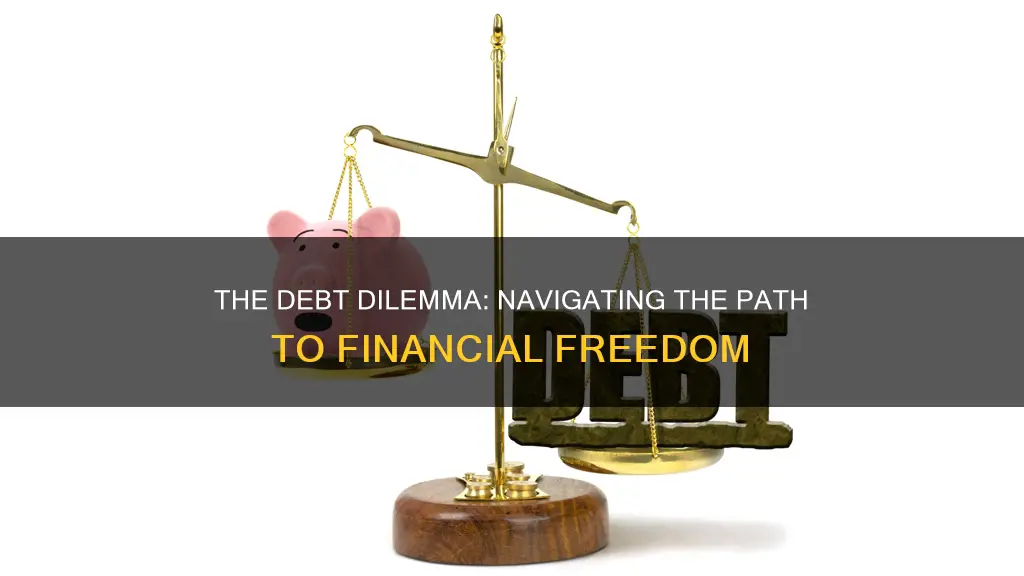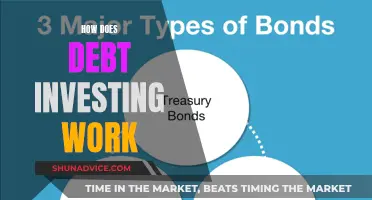
Whether to pay down debt or invest is a common dilemma. Both are worthy goals, and the answer depends on your individual circumstances.
If you have high-interest credit card debt, it often makes more sense to focus on wiping out the debt as quickly as possible, rather than trying to invest. Credit cards have rates that hover around 20%, and the stock market has historically returned 10% on average.
However, if you have a loan or credit card with a low-interest rate, you can afford to wait to pay off that debt, and instead invest your money where it will earn more over time.
If you can, it's best to do both at the same time. Even if that means you can only contribute a small amount each month to your savings or investments, it's worth doing.
| Characteristics | Values |
|---|---|
| Interest rate on debt | If the interest rate on your debt is 6% or more, you should generally pay down debt before investing additional dollars toward retirement. |
| Interest rate on investments | If you can earn more interest on your money by investing it than your debts are costing you, then it makes sense to invest. |
| Risk tolerance | If you are comfortable taking the gamble that your investments will increase in value, then you are a better candidate for investing than someone who would worry about the market. |
| Credit score | Paying off debt can improve your credit score, which is important if you want to borrow money in the future. |
| Peace of mind | If debt is causing you stress, there is nothing wrong with paying it down sooner. |
| Retirement timeline | It's typically best to avoid bringing debt into retirement, so consider your retirement horizon when deciding how quickly you need to pay down debt relative to your investment efforts. |
What You'll Learn

Paying off high-interest debt first
If you're deciding whether to pay off your debts or invest, it's important to consider the interest rate on your debt. If you have high-interest debt, such as credit card debt, it's generally recommended to focus on paying that off first. Credit cards often have interest rates of around 20%, and sometimes higher, which means that your debt can quickly accumulate. By tackling high-interest debt first, you can save yourself hundreds or even thousands of dollars in interest.
Even if you're keen to start investing, it's worth noting that the stock market has historically returned around 10% on average. This means that if you're paying off credit card debt, the math won't work in your favour. It's also worth noting that paying off high-interest debt can free up cash to add to your emergency fund or kickstart your investing plan.
If you're unsure about whether to pay off debt or invest, it's a good idea to consult a financial professional or advisor. They can help you understand the numbers and make a decision that's right for your financial situation.
Tips for Paying Off High-Interest Debt
- Create a budget: Take the time to track exactly how much money is coming in and going out. This will help you understand where you can cut back on expenses and put more money towards paying off your debt.
- Save an emergency fund: Before putting all your extra cash towards debt, it's a good idea to have a small emergency fund. This will help you cover unexpected expenses, such as car repairs or medical bills, without increasing your debt.
- Don't neglect retirement savings: While paying off high-interest debt is important, it's also crucial to continue contributing to your retirement savings, especially if your employer offers a match on your 401(k) or similar plan.
- Consider debt relief options: You may be able to lower your debt by establishing a debt management plan. A debt management counsellor can negotiate with creditors on your behalf to reduce your monthly payments and interest charges.
- Increase your income: If possible, consider taking on a side hustle or an additional job to increase your income. This can help you pay off your debt more quickly and get back on track with your investment goals.
Remember, everyone's financial situation is different, and there is no one-size-fits-all solution. It's important to consider your own financial goals, risk tolerance, and budget when deciding whether to pay off debt or invest.
Amazon: Worth Your Investment?
You may want to see also

Investing early for retirement
Understand the FIRE Movement
The FIRE (Financial Independence, Retire Early) movement challenges the traditional retirement age of 65, encouraging people to dedicate a significant portion of their income to savings and investments. This often involves extreme savings and frugality, with the goal of retiring in their 40s or even 30s. By foregoing current pleasures and investing wisely, FIRE proponents aim to achieve financial independence and retire early.
Save and Invest Aggressively
To retire early, you'll need to save and invest aggressively. This may involve cutting your budget to the bare minimum and finding ways to increase your income. Consider investing in a balanced portfolio geared towards long-term growth, including low-cost index funds and stocks. The earlier you start, the more time your investments have to grow.
Calculate Your Annual Retirement Spending
Determine how much you'll need each year during retirement. Consider your current monthly spending and adjust for expected increases or decreases in expenses. Remember to factor in taxes and healthcare costs, which can be significant. The "rule of 25" suggests having 25 times your planned annual spending saved before retiring.
Choose the Right Investment Accounts
When planning for early retirement, consider using a regular, taxable investment account. While tax-advantaged retirement accounts like IRAs and 401(k)s offer tax benefits, they often come with penalties for early withdrawals before the age of 59 1/2. A Roth IRA can be a good option, as it offers tax-free growth and allows you to withdraw contributions at any time.
Manage Risk and Returns
When investing for early retirement, balance risk and reward. While you may be tempted to take on more risk due to a shorter time horizon, remember that you'll need your investments to support you for a longer period in retirement. Consider your risk tolerance and the potential volatility of different investments. Diversifying your portfolio can help manage risk.
Stay Disciplined
Sticking to your investment plan is crucial. It's easy to let expenses creep up, especially with extra time on your hands during retirement. The "4% rule" suggests withdrawing only 4% of your invested savings in the first year of retirement, adjusted for inflation in subsequent years. Keeping your expenses in check will help ensure your retirement funds last.
Makeup Investment: Who's Spending?
You may want to see also

The tax benefits of investing
There are several tax-efficient investing strategies that can help you minimise your tax burden and maximise your returns. Here are some key considerations:
- Choose the right type of account: There are two main types of investment accounts: taxable and tax-advantaged. Taxable accounts, such as brokerage accounts, offer more flexibility but have fewer tax benefits. Tax-advantaged accounts, such as IRAs and 401(k)s, provide tax breaks but have annual contribution limits and penalties for early withdrawals.
- Select the right investments for each account type: Place tax-efficient investments, such as municipal bonds and index funds, in taxable accounts. Put less tax-efficient investments, like corporate bonds and actively managed funds, in tax-advantaged accounts.
- Diversify by tax treatment: Spread your investments across accounts with different tax treatments to give you more flexibility in managing your taxes during retirement. This strategy, known as "tax diversification", can help you optimise your tax bracket and minimise your overall tax burden.
- Estate planning and charitable giving: Using different account types for estate planning and charitable giving can provide tax benefits. For example, donating appreciated securities from taxable accounts can result in a full fair market value deduction without capital gains tax.
- Rebalancing your portfolio: Periodically rebalancing your portfolio to maintain your target asset allocation can impact your tax liability. Selling assets in taxable accounts may trigger capital gains taxes, so consider focusing your rebalancing efforts on tax-advantaged accounts.
- Active trading: Active trading strategies are generally better suited for tax-advantaged accounts. Realised losses in these accounts cannot be used for tax-loss harvesting.
- Income preferences: You may prefer to hold bonds in taxable accounts for easier access to income, even if tax-advantaged accounts make more sense from a tax perspective. Compare the after-tax returns of different options to make an informed decision.
- Estate planning issues: If you plan to leave stocks to your heirs, consider holding them in taxable accounts. Upon your death, the cost basis will be calculated based on the market value of the stocks at that time, potentially resulting in a lower tax burden.
- Roth IRAs: Qualified distributions from Roth IRAs are tax-free, so consider placing assets with high return potential in these accounts.
Treasury Bills: Safe and Liquid Investments
You may want to see also

Credit score impact
Your credit score can be impacted by both paying down debts and investing, so it's important to understand how each action affects your score to make an informed decision.
Paying Down Debts
Paying down debts, especially credit card debts, can have a significant positive impact on your credit score. Credit card debt is considered revolving debt, which is weighted more heavily in credit score calculations than instalment debt, such as mortgages, student loans, auto loans, and personal loans.
The credit utilisation ratio, which is a major factor in credit scoring models, can be improved by paying down credit card debt. This ratio compares the balance on revolving credit accounts to the total credit limit. A lower ratio, generally below 30%, is favourable for maintaining a good credit score.
Additionally, paying off credit cards with high interest rates can reduce your risk of accumulating more debt, which could hurt your credit score. Credit bureaus view timely payments of credit card balances and monthly mortgage payments very positively, as they indicate your ability to manage debt.
However, it's important to note that paying off student loans or other instalment debts may not improve your credit score as significantly as paying off credit card debt. This is because instalment debts have a fixed loan amount and repayment schedule, and their impact on your credit score is primarily through maintaining a consistent payment history.
Investing
Investing does not directly impact your credit score, but it can affect your overall financial health and ability to manage debt. Investing can be a good strategy if you can earn a higher interest rate on your investments than the interest rate on your debts.
However, investing instead of paying down high-interest credit card debt may not be advisable, as it could lead to accumulating more debt and negatively impact your credit score.
Key Considerations
- Credit bureaus consider it favourable to have some revolving debt and make timely payments, rather than having no debt at all.
- Paying off debts with the highest interest rates first can help improve your credit score by reducing your overall debt burden.
- Maintaining a credit utilisation ratio below 30% is important for a good credit score.
- Investing can be a viable option if the expected returns are higher than the interest on your debts, but it may not be advisable if you have high-interest credit card debt.
Wisdom Tree Investments: Unlocking Growth Through Dividends
You may want to see also

Peace of mind
- Interest Rates: High-interest credit card debt can be financially crippling and stressful. Credit cards often have interest rates of around 20% or higher, which can make it challenging to get ahead of the debt. By paying off these high-interest debts first, you can save money on interest and free up cash flow for other financial goals.
- Credit Score: Carrying a lot of debt, especially credit card debt, can negatively impact your credit score. A low credit score can affect your ability to borrow money, rent an apartment, or even get hired for certain jobs. Reducing your debt can improve your credit score and provide peace of mind in these areas.
- Financial Stability: Paying off debt improves your financial stability and reduces the risk of falling into a debt spiral. It can also lower your monthly expenses, giving you more breathing room in your budget. This improved financial stability can lead to better peace of mind and less worry about making ends meet.
- Psychological Factors: Everyone has a different risk tolerance. If the thought of investing makes you anxious or keeps you up at night, then paying off debt may be a better option for you. Peace of mind is about more than just numbers; it's also about how you feel and your overall well-being.
- Retirement Planning: It's generally recommended to avoid carrying debt into retirement. However, not all debt is created equal. For example, a mortgage is often considered "good debt" because it helps you build wealth through homeownership. On the other hand, credit card debt is considered "bad debt" because it doesn't provide any value and eats away at your cash flow. Prioritizing the elimination of "bad debt" can give you peace of mind as you approach retirement.
- Emergency Fund: Before investing, it's crucial to have an emergency fund to cover unexpected expenses. This will help you avoid racking up more debt in the future. Aim to save enough to cover at least three to six months' worth of living expenses.
- Compound Interest: While investing early and taking advantage of compound interest is important, it's also essential to consider the interest you're paying on your debt. Eliminating high-interest debt can provide a better return on your money than investing, especially if you're only earning a low rate of return.
In conclusion, achieving peace of mind involves finding a balance between paying down debt and investing. It's important to consider your financial situation, interest rates, risk tolerance, and long-term goals. By prioritizing high-interest debt repayment and building an emergency fund, you can improve your financial stability and reduce stress and anxiety related to debt. At the same time, don't neglect retirement planning and take advantage of compound interest by investing early, but only if it aligns with your risk tolerance and financial goals.
Nifty: Invest Now or Later?
You may want to see also
Frequently asked questions
This depends on your circumstances, but as a general rule, if you can earn more interest on your money by investing it than your debts are costing you, then it makes sense to invest.
The sooner you eliminate debt, the less interest you will have to pay on that debt. With no debt payments, you may have more money in your budget to save and invest. Reducing debt can also improve your credit score.
Investing for the long term involves increased growth potential. Compounding interest is the interest earned on your interest, which means your money can grow without any extra effort.
Yes, it is possible to do both. You can start by contributing small amounts to each.







